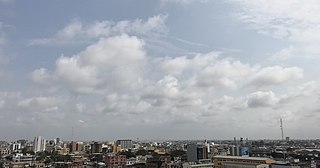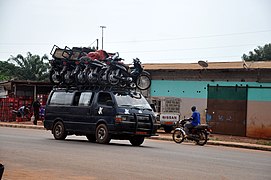
Transport in Burkina Faso consists primarily of road, air and rail transportation. The World Bank classified country's transportation as underdeveloped but noted that Burkina Faso is a natural geographic transportation hub for West Africa.

Ivory Coast invested remarkably in its transport system. Transport Infrastructures are much more developed than they are other West African countries despite a crisis that restrained their maintenance and development. Since its independence in 1960, Ivory Coast put an emphasis on increasing and modernizing the transport network for human as well as for goods. Major infrastructures of diverse nature were built including railways, roads, waterways, and airports. In spite of the crisis, neighbor countries still strongly depend on the Ivorian transport network for importing, exporting, and transiting their immigrants to Ivory Coast.

Niger's transport system was little developed during the colonial period (1899–1960), largely relying upon animal, human, and limited river transport in the far southwest and southeast. No railways were constructed in the colonial period, and roads outside the capital remained unpaved. The Niger River is unsuitable for large-scale river transport, as it lacks depth for most of the year and is broken by rapids in many areas. Camel caravan transport was historically important in the Sahara desert and Sahel regions which cover most of northern Niger.
This article refers to transportation in the country of Togo.

Cotonou is a city in Benin. Its official population count was 761,137 inhabitants in 2006; however, some estimates indicate its population to be as high as 2.4 million.

Benin, a narrow, key-shaped, north–south strip of land in West Africa, lies between the Equator and the Tropic of Cancer. Its altitude ranges from 6°30′ N to 12°30′ N and its longitude from 1° E to 3°40′ E. It is bounded by Togo to the west, Burkina Faso and Niger to the north, Nigeria to the east, and the Bight of Benin to the south.

After seizing power in the 1972 coup d'état, Major Mathieu Kérékou declared the Republic of Dahomey a Marxist-Leninist state and sought financial support from communist governments in Eastern Europe and Asia. To distance the modern state from its colonial past, the country became the People's Republic of Benin in 1975. However, Benin dropped the socialist ideology in 1989 following pressure from creditors and domestic unrest related to economic hardship.

The Central Bank of West African States is a central bank serving the eight west African countries which share the common West African CFA franc currency and comprise the West African Economic and Monetary Union (UEMOA):

The Trans–West African Coastal Highway or TAH 7 is a transnational highway project to link 12 West African coastal nations, from Mauritania in the north-west of the region to Nigeria in the east, with feeder roads already existing to two landlocked countries, Mali and Burkina Faso.
AfricaRail is a project to link the railway systems of Ivory Coast, Burkina Faso, Niger, Benin and Togo. These are all 1,000 mm gauge.

The Trans-Sahelian Highway or TAH 5 is a transnational highway project to pave, improve and ease border formalities on a highway route through the southern fringes of the Sahel region in West Africa between Dakar, Senegal in the west and Ndjamena, Chad, in the east. Alternative names for the highway are the Dakar-Ndjamena Highway or Ndjamena-Dakar Highway and it is Trans-African Highway 5 in the Trans-African Highway network.

Benin has a total of 578 km (359 mi) of single track, 1,000 mm railway. Rail construction began around 1900, with regular services commencing in 1906; rail operation was taken into government control in 1930.

This is a survey of the postage stamps and postal history of Benin, formerly Dahomey.
The West African Power Pool (WAPP) is a cooperation of the national electricity companies in Western Africa under the auspices of the Economic Community of West African States (ECOWAS). The members of WAPP are working for establishing a reliable power grid for the region and a common market for electricity. It was founded in 2010.

There is currently one railway in Niger, built between 2014 and 2016 between Niamey and Dosso by the French Bolloré conglomerate. The objective was to connect Niamey to the rail network in Benin and thus to the coast. But competing commercial interests by several parties resulted in endless litigation and the connection to Benin never materialized. So the 145 km Niamey-Dosso stretch now lies orphaned and unused, with the tracks ending in the middle of nowhere some 6 km south of Dosso. After 5 years of neglect the tracks are already damaged to such an extent in some places, that they have become unusable.
Bénirail is the concessioned railway system of Benin. It is being rehabilitated by the Bolloré Group.
The West African Games was an international multi-sport event between the nations of West Africa, which was held in Lagos, Nigeria in 1977. Opened on 27 August by Nigeria's head of state, Olusegun Obasanjo, ten countries took part in the eight-day competition. A total of eleven sports were contested.
Foreign trade, particularly informal transit trade, plays an important role in Benin's economy.





















